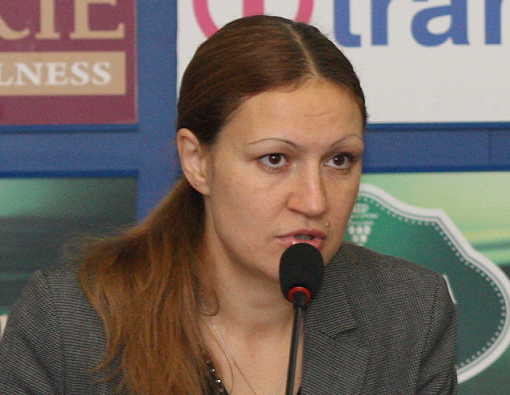Photo: OffNews
Desislava Nikolova is chief economist at the Institute for Market Economics (IME) and currently its interim CEO. The Institute is a non-profit organisation that deals with the analysis of economic policies in Bulgaria, aiming to justify the benefits of free choice in various spheres of the economic life and to promote less interference in it on the part of the state. Desislava Nikolova talks to Polina Spartyanova.
 How has the political instability in Bulgaria, since January-February 2013, affected the economy of the country?
How has the political instability in Bulgaria, since January-February 2013, affected the economy of the country?
The energy sector is a very bad example of what this vacuum can cause. It formed in politics because of the lack of government for part of last year and due to the absence of Parliament during the term of the interim government. Over the past year and a half, Bulgaria has lived in a political crisis and therefore the classical consequences of a political crisis on the economic life in different directions are apparent. In terms of our work, this relates to the lack of reforms in the most difficult spheres, in the budget and the economy in general, and even steps backwards have been made in some areas, which is a kind of regression that is motivated by populist arguments such as the power industry. In it we saw that the "independent" regulatory body acts under pressure of the government, making decisions that are detrimental to the entire electricity system, increasing the imbalances in it, the mutual obligations and debts, only to reduce the cost of electricity for consumers with several percentage points. An IME analysis shows that the decisions made by the regulator (the State Commission for Energy and Water Regulation) in several periods over the past year are contrary not only to the national legislation, but also to the European principles of non-cross subsidization between the separate participants in the market, regarding the reasonable coverage of reasonable costs through pricing decisions. It is clear that the regulator systematically refuses to approve the investment costs of the electricity companies, to the detriment of the whole system, because no quality service can be provided in the absence of investments. Eventually electricity prices will have to be increased but this will not solve or exhaust all the problems in the power sector.
The culmination of the entire political crisis was the decision of Standard & Poor's rating agency to lower the rating of Bulgaria with one point. At present, the rating of the country is the last before the so-called junk ratings, but it is still in the category of the investment credit rating.
Bulgaria is dependent on Russia in terms of energy. What do you think can be done to diversify the energy sources in our country?
In terms of electricity, for example, we need to consider the involvement in the pan-European networks in the case of a decline in production here and in crises so that other countries can be included in the event of a collapse of the local system. Electricity is a specific commodity, there is no way to store it, and therefore it must be instantly consumed in an effective manner.
In terms of gas, Bulgaria has several deposits in northeastern Bulgaria, near Shabla and Kaliakra, which over the years have covered between 10% and 15% of the country's requirements. Nabucco pipeline was also a good option to provide alternative ways for gas supply. Another option, which I think should not be disregarded, is shale gas and it should be explored, taking all necessary measures to protect the environment.
The detrimental dependence on Russia in every aspect of the power industry that extends beyond the energy sector, to Bulgaria’s overall economy and policy, is apparent. Obviously some political parties are financed by Moscow precisely for this purpose, namely to maintain the political status quo and fight against the diversification of supplies and against the search for options for diversification. This should also be on the agenda of the new government, but I rely on the European Commission, because it appears that there is already such a priority at the European Union level. I think a united effort and coordinated action such as the plan for a European energy union, which is currently being considered and discussed, could be of great benefit to us.
What caused the collapse of Corporate Commercial Bank? Did the Bulgarian institutions respond adequately in this case in your opinion?
The political crisis extended to the banking sector, which is a classic scenario in many other countries, i.e. its influence “spilled”. Due to the quick action on the part of the central bank and the government, and of the banks themselves, the crisis was under control, but it illustrates the fragility of the banking system and the economy, and their susceptibility to similar political and economic scandals, especially in terms of lack of confidence in the political status quo.
The shaken political situation and those scandals that occurred in the CCB-Peevski group, and in the groups with economic interests reduced the level trust, and a banking system and its stability are built on trust. No bank is able to survive in the presence of low confidence because no bank holds 100% of all deposits.